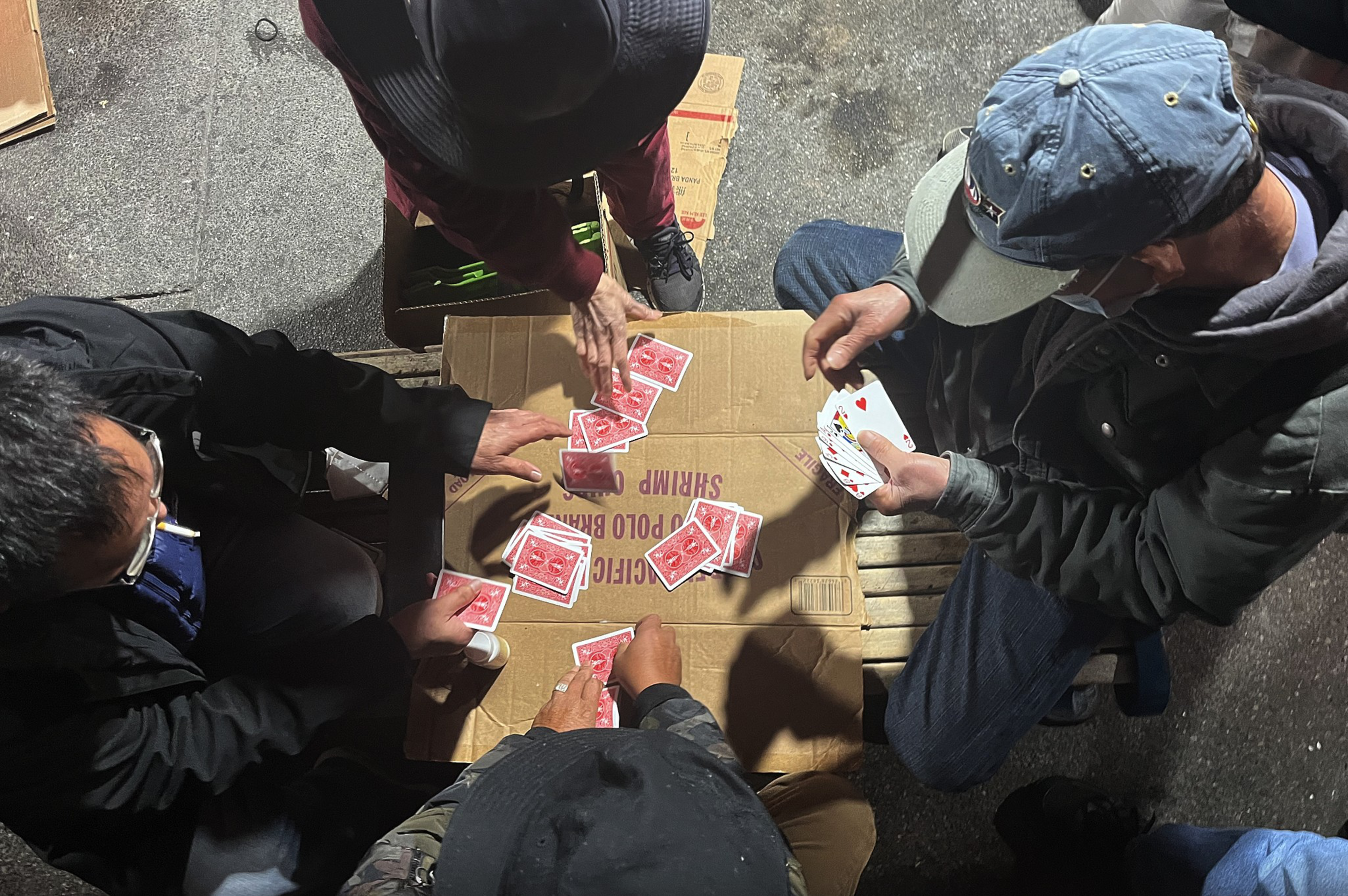Ruimin Cai isn’t a talkative elder. Many days, he can be found quietly watching his friends play poker at Portsmouth Square, the so-called “living room” of San Francisco’s Chinatown.
“It’s so boring staying at home,” Cai said in Chinese. “I don’t know English. I have so much time.”
As with many older immigrants who moved to this country to reunite with families, language barriers meant Cai had no choice but to give up on assimilating into “mainstream” society. The consequences can be significant: loneliness and social isolation, depression and mental illness.
Every day, dozens of monolingual seniors escape their tiny single-room occupancy (SRO) homes and gather among Portsmouth Square’s benches and tables. They play poker, laughing and talking in their native tongues. They enjoy the feeling of being connected, not neglected.
“Most of us are over 70 or even 80 years old,” Cai said. “Except for two meals a day, this is what we are doing.”
Banding together for a brief relief from isolation, Cai and his poker buddies stand out among Chinatown’s large population of seniors. As the alleged assailants in two recent mass shootings are older Asian men, advocates are now shedding light on this often ignored and vulnerable community’s mental health needs (opens in new tab).

Stigma Against Mental Illness
Rudy Kao, a retired mental health counselor focusing on Chinese American immigrants, said the stigma surrounding mental illness in the Chinese community has pushed many families away from seeking help.
“Chinese people are afraid of talking about mental health, depression, et cetera,” Gao said.
Isolation and feelings of loneliness may develop into desperation, which can lead to violent behaviors.
In Cantonese language and culture, negative connotations related to mental health have worsened the stigma, as the vulgar words 黐線 (opens in new tab) (or “chi sin,” meaning “insane, crazy”) and 傻(“sho,” meaning “stupid”) are often used to describe mental health patients.

Kao, 87, noted that mental health problems among senior may have many causes, including elder abuse and bullying, discrimination, financial shortages and housing insecurities. Chinese immigrants tend to hide their problems until they’ve piled up and become uncontrollable, which could be too late, Kao said.
In a jail interview (opens in new tab) with NBC Bay Area, the Half Moon Bay shooter, 67-year-old Chunli Zhao, said that he suffered from bullying and may have mental illness.
Kao emphasized that mental illness can be treated, and Chinese Americans should be more outspoken about it.
“It’s not that scary,” Kao said. “If [the seniors] don’t talk about it, the harm will be both to themselves and also their families.”
‘Imprisonment’ Since Hate Spike
The rise of anti-Asian hate incidents may have drastically decreased seniors’ interest in going outdoors and socializing in public, as stay-home orders only added more isolation to their already marginalized social lives.

“Each insane and unprovoked attack on our seniors really scared our seniors into imprisonment by themselves in their own homes,” said Anni Chung, the president of the Self-Help for the Elderly. “That’s very, very bad for their mental health and physical health.”
Chung, a longtime senior services leader and activist, said now mental health issue is a “big priority” for the organization and also the community because many seniors refused to leave home and may have suffered from mental stress.
Kao explained that the balance of social life is important for seniors, as it could be dangerous for many Asian seniors to live alone and have limited interaction with others.
After the two mass shootings, the mental health needs of Asian seniors have gotten the attention of elected officials.
Assemblyman Phil Ting, who represents San Francisco neighborhoods with a significant number of Asian residents, has allocated $6.5 million to help a local nonprofit acquire a permanent space for senior wellness and boost mental health services.
Dancing Together
Except for the well-known “Senior Escort” program to accompany elder people as a way of getting them out more, Self-Help for the Elderly also runs elder-centric community centers.
Dancing together has been a popular form (opens in new tab) of exercise and socializing.
The shooting in Monterey Park took place at a dance studio, which had served as a place for Asian seniors to thrive (opens in new tab). The hand waves and slight jumping gestures in the dancing exercises became part of their life, power, community experiences and emotional expression when living in this often-unfamiliar country.
Tina Liang, who refused to disclose her age but said she’s over 70, leads a dancing group in the South Sunset Community Center.

“I feel happy when dancing here,” she told The Standard. Laughing with pride, she added, “I know and remember all the gestures.”
Liang, a self-taught choreographer, has created a “Jade Rabbits Welcome New Year (opens in new tab)” performance. On a sunny morning in February, she turned on the music and started dancing with others in the playground.
“Today is a good day,” said Baolan Yang, a dancer in the group. “Even if it’s a windy day, we will come here to dance.”
